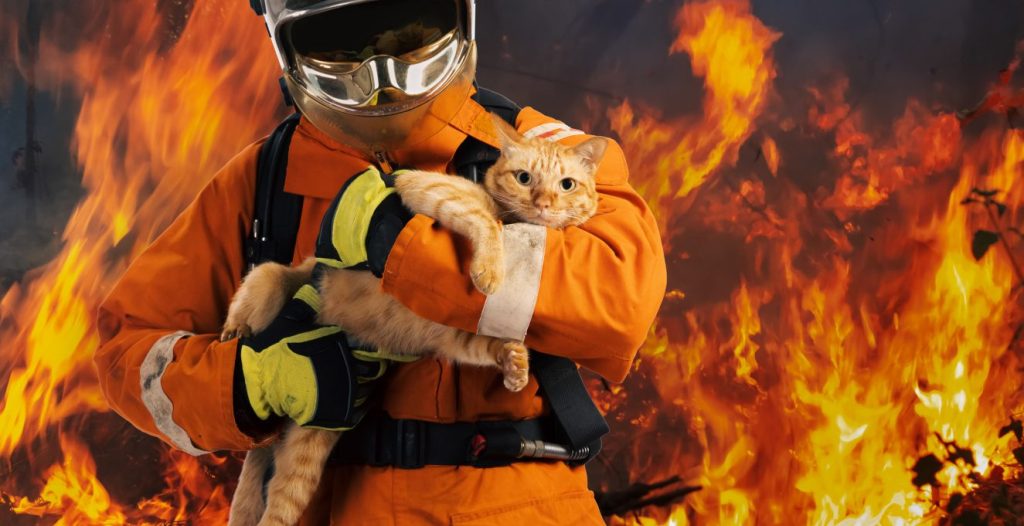Summer is here and hotter temperatures, along with corresponding drier periods, means an increase in wildfires. According to Reuters, Canada is on track for its worst-ever wildfire season. As climate change worsens, wildfires will continue to pose a significant threat to communities around the world. It is essential to recognize the impact of wildfire smoke not only on humans, but also on our beloved pets, and that includes our cats. Wildfire smoke contains harmful pollutants and fine particulate matter that can lead to various respiratory issues in cats. We’re going to break down the effects of wildfire smoke on cats, signs of smoke irritation to watch out for, and crucial measures to protect your feline friends during this dangerous environmental period.
How wildfire smoke affects cats
Wildfire smoke consists of tiny particles and harmful gases that can penetrate the respiratory system, causing irritation and potential damage to a cat’s delicate respiratory tissues. Cats, like humans, can experience both short-term and long-term health effects from exposure to wildfire smoke.
“Animals, just like us, need to breathe,” Olivia Sanderfoot, a postdoctoral fellow specializing in wildfire smoke’s effects on wildlife at the La Kretz Center for California Conservation Science at the University of California, Los Angeles, told Time. “If the air that they’re breathing is full of toxic particles, that is going to have an impact on their health.”
Signs of wildfire smoke irritation in cats
It is crucial for cat owners to be vigilant and observe any changes in their feline companion’s behavior or health during periods of heightened wildfire activity.
Some common signs of smoke irritation in cats include:
- Coughing and wheezing: Cats may develop a persistent cough or exhibit wheezing sounds while breathing.
- Sneezing and watery eyes: Cats may experience frequent sneezing fits and have watery or irritated eyes.
- Difficulty breathing: Rapid, shallow, or labored breathing can indicate respiratory distress in cats.
- Lethargy and decreased appetite: Cats exposed to wildfire smoke may become lethargic, lose interest in food, or experience a decrease in appetite.
- Increased grooming or pawing at the face: Cats may excessively groom themselves or paw at their face due to discomfort or irritation caused by smoke particles.
Long-term exposure to wildfire smoke can lead to chronic respiratory conditions or aggravate pre-existing respiratory conditions in susceptible cats.
How to protect your cat from wildfire smoke
While it may be challenging to completely shield cats from wildfire smoke, taking proactive steps can help minimize their exposure and mitigate potential health risks. Here are some essential measures to take to protect your cat during periods of increased wildfire activity:
Keep cats indoors
Create a safe and smoke-free environment by keeping your cat indoors. Close windows and doors to prevent smoke from entering the house. If necessary, you may place towels at door sills to block outside air from entering your home.
Filter indoor air
Use high-quality air purifiers equipped with HEPA filters to reduce smoke particles indoors. Place them strategically in rooms where your cat spends most of its time. If possible, set your air conditioning unit to recirculate air instead of pulling in outside air while conditions remain hazardous. Avoid burning anything in your home or cooking with gas stoves if possible.
Create a safe room
Designate a specific room or area in your home as a “safe room” for your cat. Ensure it is well-ventilated and equipped with air purifiers to maintain clean air quality.
Limit outdoor exposure
Avoid taking your cat outside during times of heavy smoke or poor air quality. This will significantly reduce their exposure to smoke particles.
Consult with your veterinarian
If you notice any signs of smoke irritation in your cat, seek prompt veterinary care. Your veterinarian can provide specific guidance and may recommend additional measures or treatments to alleviate your cat’s symptoms.
Monitor air quality
Stay informed about local air quality conditions by monitoring reputable sources such as air quality indexes or local authorities. Adjust your protective measures based on the severity of the smoke in your area.
Keep cats hydrated
Ensure your cat has access to clean, fresh water at all times. Proper hydration can help maintain respiratory health and flush out any potential irritants.
Surviving wildfire season with cats
Protecting your cat from the harmful effects of wildfire smoke is crucial to their overall well-being. By understanding how smoke affects cats, recognizing signs of irritation, and implementing preventive measures, you can provide a safer environment for your feline friends during times of increased wildfire activity.
Remember, consulting with your veterinarian is essential for proper guidance and ensuring your cat’s health is the best it can be. By following the guidance above, you can navigate these challenging times and safeguard the health and happiness of your cherished fur baby.
For more about wildfire preparedness and how to create a wildfire evacuation plan for yourself and your cat, check out this guide.









